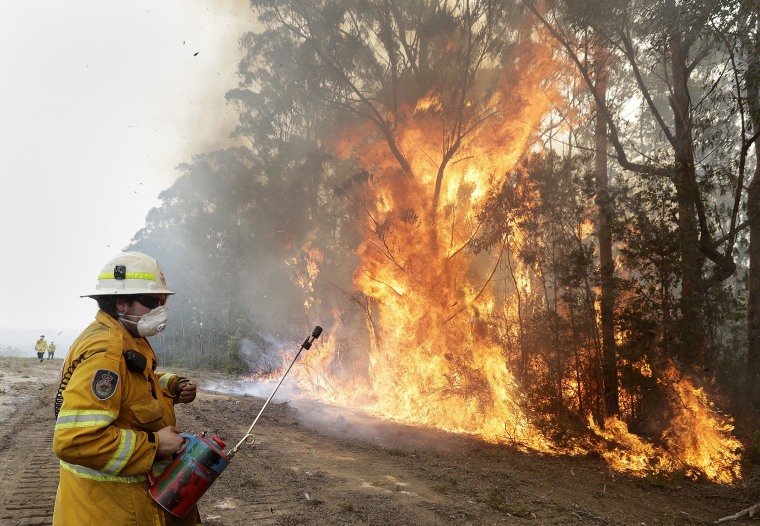Climate change deniers are blaming Australia’s wildfires on arson, but experts say that the exaggerated claims are part of a widespread disinformation campaign and that arson alone cannot explain the unprecedented blazes.
Theories pinning the wildfires on arsonists gained traction in recent days after police in the state of New South Wales announced that 24 people have been charged with deliberately lighting fires since November.
But wildfire researchers say it’s unreasonable to think the actions of two dozen possible offenders could have caused such destruction, with 20 million acres already scorched and more than 120 fires still active across southeastern Australia.
“Arson is a red herring,” said Mike Flannigan, director of the Canadian Partnership for Wildland Fire Science at the University of Alberta in Edmonton.
The politicization of climate change and the popularity of social media have provided fertile ground for misinformation. On Twitter, established networks of accounts seized on the arson claims, helping them trend on the platform.
Richie Merzian, director of the climate and energy program at the Australia Institute, a Canberra-based think tank that conducts public policy research, said the arson theories are being used to deflect from discussions of climate change.
“The number of arsonists this summer [is] not higher than usual — the only thing that has changed is the disinformation campaign to elevate this as [a]key cause to explain the unprecedented bush fires,” Merzian said in an email.
The campaign has been far-reaching. Timothy Graham, a senior lecturer in digital media and communication at Queensland University of Technology in Brisbane, analyzed chatter about the fires on Twitter and found that tweets with the hashtag #ArsonEmergency, which saw an uptick in activity starting a few weeks ago, were disproportionately coming from highly partisan accounts or automated bots.
“They’re fictional accounts,” Graham said. “You don’t find, at least for this hashtag, many accounts that seem to be real human beings who could be identified in any way.”
He said his analysis revealed the hallmarks of inauthentic accounts that try to shift the narrative and promote skepticism of climate change.
“It really looks, in many ways, like classic disinformation,” he added. “Australia has been pulled into a global disinformation landscape.”
Similar misinformation campaigns have occurred before to discredit climate science, as in CNN’s climate change town hall in September and around discussions of the environmental consequences of fires in the Amazon rainforest.
Popular conservative, far-right and conspiracy figures all pushed the exaggerated arson claims to millions of followers on Twitter, Facebook and Instagram.
Flannigan estimates that only a handful of the hundreds of massive fires that have broken out in Australia since September were due to arson. Rather, he said, many of the blazes likely were started by lightning in extremely hot and dry parts of the continent — all dangerous ingredients for wildfires and all conditions that are exacerbated by climate change.
“The problem with climate change is that it is lengthening the fire season, causing more lightning and leading to much drier fuels at times due to warmer temperatures,” Flannigan said in an email. “Drier fuel means it is easier for a fire to start, and to spread and to burn more intensely as more fuel is available to burn.”
Although seasonal wildfires occur naturally around the world, studies have shown that global warming is making certain regions hotter and drier, increasing the frequency and severity of wildfires.
Many of the social posts blaming arson linked to an article from The Australian, a newspaper owned by Rupert Murdoch, that echoed claims that arsonists played a role in starting the fires. Because of the social push, the article quickly became the paper’s most engaged-with article of the past year, attracting 200,000 comments, likes and shares across social media, according to a search of BuzzSumo, a social media analysis tool.
BuzzFeed News reported that the article initially misstated the number of recent arson arrests and has since been updated.
Donald Trump Jr. and Charlie Kirk, president of the conservative group Turning Point USA, posted some of the most popular arson-related tweets, attracting tens of thousands of likes and retweets.
The severity of the fires has attracted strong public interest, but incorrect information and doctored photos have circulated even among those looking to help, including a dramatic 3D visualization that appeared to show large areas of Australia engulfed in fire. Many circulated the image on social media, apparently mistakenly thinking it was a view of the blazes taken from space.
Australia’s political leaders have done little to quell the falsehoods.
Prime Minister Scott Morrison has faced backlash for failing to acknowledge links between the wildfires and climate change. Morrison was also criticized for taking a family vacation to Hawaii in December while the fires raged. In November, Deputy Prime Minister Michael McCormack said climate change concerns were stoked by "raving inner-city lefties.”
More recently, McCormack said there had been “a lot of hysteria about climate change” and suggested that while lightning may cause wildfires, the blazes could also be explained by arsonists and self-combusting piles of manure. He admitted, though, that more action is needed to address climate change and said he recognizes the fires have boosted anxiety among locals about global warming.
Merzian, of the Australia Institute, said Morrison and his government are playing a key role in spreading disinformation by not acknowledging the impact of climate change.
“Australia is the 14th largest greenhouse gas emitter and third largest exporter of fossil fuels, its contribution to the climate crisis is sizable,” Merzian said. “The prime minister should use this moment to increase Australia’s climate efforts at home and abroad, rally countries for higher ambition, not fuel disinformation and shirk responsibility. Until that happens, Australia will continue to suffer.”


